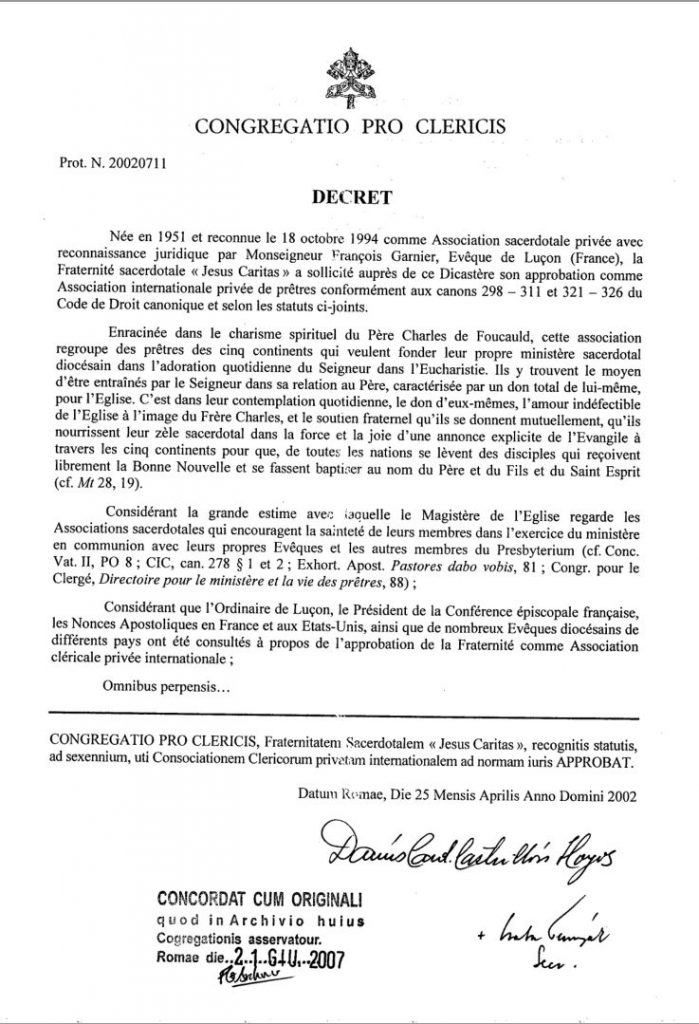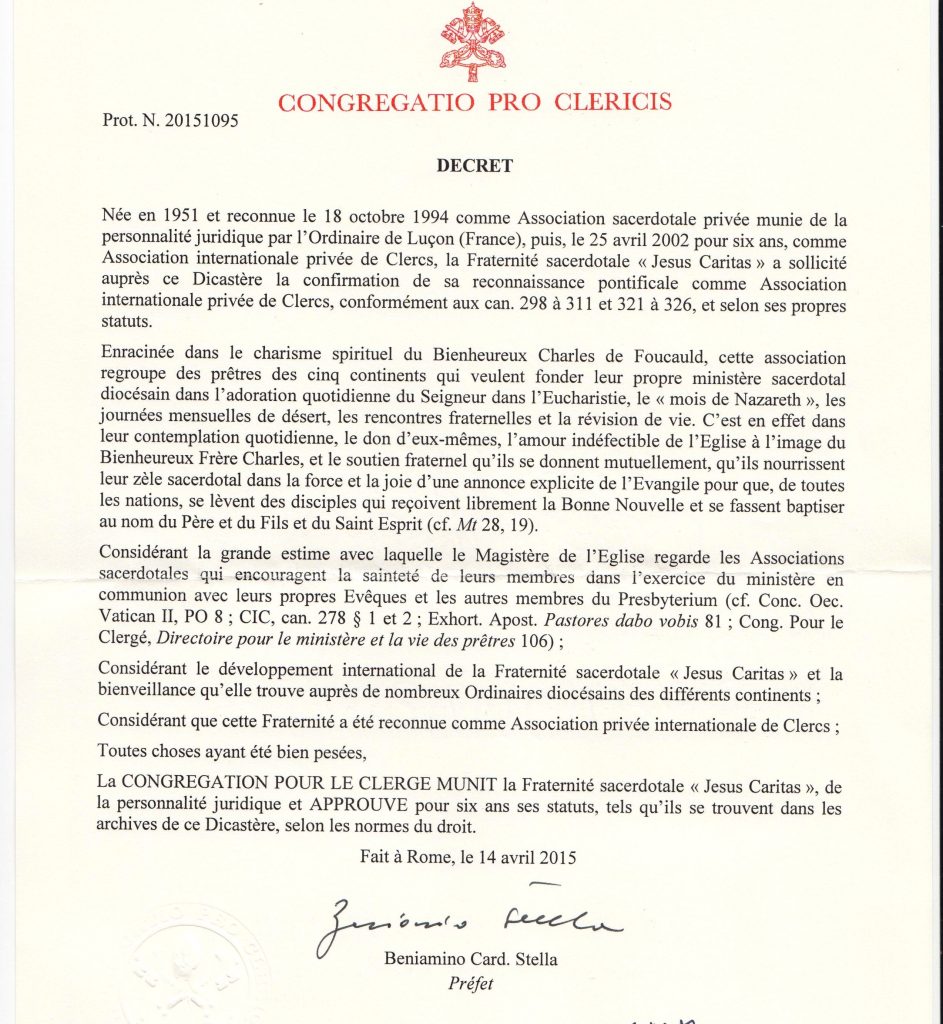Author Archives: Fraternidad Iesus Caritas
(Português) FRATERNIDADE DO BRASIL: O NOSSO IRMÂO JEOVÁ ELIAS FERREIRA, NOVO BISPO
Fraternity approval Decrees, CONGREGATIO PRO CLERICIS, 2002 and 2015
(Italiano) Picolli Fratelli Jesus Caritas. Maggio 2020
(Français) Nouvelles de la Famille Spirituelle de Charles de FOUCAULD – mai 2020
(Español) Relieves del hermano Carlos. Antonio OTEIZA
(Español) Ocho relieves para orar con Carlos de FOUCAULD. Antonio OTEIZA
(Español) Boletín Horeb Ekumene, mayo 2020
Easter letter 2020 to the brothers around the world. Eric LOZADA
Philippines, 12 April 2020
I am risen, and I am with you still, Alleluia. (cf. Ps 139:18)
Beloved brothers,
I am writing to you from my hermitage just like many of you in quarantine. This imposed enclosure is an excellent invitation for daily adoration, Gospel meditation, desert day, review of life, praying for the world, especially the poor, with fidelity, intensity and focus. A quality life of solitude and prayer is our humble act of charity to our world in pandemic.
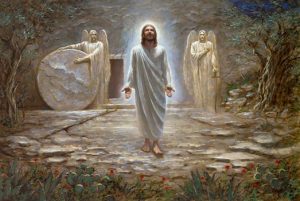 Looking through my window, I am watching for signs of new life from Nature. It’s dry and humid here but birds are playing and singing their unique repertoire of songs, butterflies gently flying from flower to flower looking for nectar, trees are looking green and giving shade in spite of the battering heat. Amazing, how nature has its own way of heralding the Resurrection. No worries, complete abandon to God who takes care of them. We, humans are supposed to be a superior breed because of our reason but the same has systematically edged out trust in God in the day-to-day and we rely more on our egoic thinking. This same thinking has been the cause of violence, hatred and mistrust. Resurrection is offering forgiveness, love and trust. The world has to choose.
Looking through my window, I am watching for signs of new life from Nature. It’s dry and humid here but birds are playing and singing their unique repertoire of songs, butterflies gently flying from flower to flower looking for nectar, trees are looking green and giving shade in spite of the battering heat. Amazing, how nature has its own way of heralding the Resurrection. No worries, complete abandon to God who takes care of them. We, humans are supposed to be a superior breed because of our reason but the same has systematically edged out trust in God in the day-to-day and we rely more on our egoic thinking. This same thinking has been the cause of violence, hatred and mistrust. Resurrection is offering forgiveness, love and trust. The world has to choose.
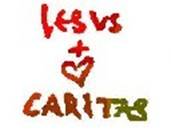 We are in enhanced community quarantine until May 3 but priests are given access passes for liturgical and charitable works. I have been using it every day to visit people where I am invited to accompany the dying and the family in their loss, facilitate dialogue in families, give food and money to those who have been laid off from work. Someone moved me to be with the people in their helplessness especially because they could not go to church and pray. The Presence brought by my presence is a soothing balm of comfort for them. I have been extra careful though to follow the protocols of hygiene and distancing in order not to give more harm to the community. This morning, my friend Lemuel came to the hermitage very hungry, haggard-looking, asking for food for his starving 4 young kids. Lemuel has been laid off from work. Handing over to him some goods, I am blessed by his joy but I also feel the uncertainty in his eyes.
We are in enhanced community quarantine until May 3 but priests are given access passes for liturgical and charitable works. I have been using it every day to visit people where I am invited to accompany the dying and the family in their loss, facilitate dialogue in families, give food and money to those who have been laid off from work. Someone moved me to be with the people in their helplessness especially because they could not go to church and pray. The Presence brought by my presence is a soothing balm of comfort for them. I have been extra careful though to follow the protocols of hygiene and distancing in order not to give more harm to the community. This morning, my friend Lemuel came to the hermitage very hungry, haggard-looking, asking for food for his starving 4 young kids. Lemuel has been laid off from work. Handing over to him some goods, I am blessed by his joy but I also feel the uncertainty in his eyes.
After prayer this morning, I take a long loving look at the map posted at my wall. My eyes are fixed at the four continents of Africa, Europe, Asia, the Americas. The virus is indeed a great equalizer for rich and poor countries are suffering from the same fate. I see faces of doctors, nurses, patients, their families, worried, afraid yet fighting for life. (While writing, I am informed that my sister working as a nurse in the US is COVID positive. Her family is now at risk).
 The world is undergoing its passion. I see faces of helplessness, worry, fear, sadness, hatred, violence everywhere in multiple disguises. I ask: what is the message of the Resurrected Christ to our world today? What is God inviting us to see? Where is he leading us? Does Resurrection mean He will rescue us from all these? What is God’s response to His people in pandemic? How is the gentle message of the Resurrection be heard amidst the overpowering news of death, suffering, conflict? Where is the path of hope and new life in this our difficult time?
The world is undergoing its passion. I see faces of helplessness, worry, fear, sadness, hatred, violence everywhere in multiple disguises. I ask: what is the message of the Resurrected Christ to our world today? What is God inviting us to see? Where is he leading us? Does Resurrection mean He will rescue us from all these? What is God’s response to His people in pandemic? How is the gentle message of the Resurrection be heard amidst the overpowering news of death, suffering, conflict? Where is the path of hope and new life in this our difficult time?
Brothers, please suffer with me these questions. I need you, we need each other, the people need us. Resurrection is not some cheap joy nor sweet sounding words to rescue us from our suffering. We have to strain our ears and stretch our hearts to hear the Message. We wrestle with God for answers even if his answer is hidden in His silence.
I find the reading of John’s version of the Resurrection narrative this year a Kairos. Some details from John could help us see and hear the Message. Since I am not schooled in biblical hermeneutics that well, I rely on a prayerful reflection of the text. Please be generous if it sounds naïve.
Let me just point out 3 things. First, John speaks of the Resurrection as happening “on the first day of the week, while it was dark.” (Jn. 20:1a) Resurrection bursts forth from the very foundations of our humanity and the world, in the darkness of unknowing. This reminds us of Genesis when the world was dark and formless and the Spirit hovered over the dark waters. Then God said: “Let there be light and there was light.” (Gen. 1:2-3)
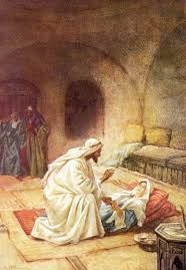 Today, the world is in the darkness of the pandemic. The future even seems darker for many. How shall businesses, government, the people recover? Is our strategic planning, optimistic forecasts, finding the cure enough light to give us a bright future? In the midst of utter darkness, where the world’s foundations seem to be shaken, Christ the light bursts forth. Can we see? Seeing does not come from our human logic for the same is easily defeated by darkness. Light comes from the Resurrected Christ. Is God going to rescue us from this evil? Not at all for evil does what it does. God redeems. He ultimately vindicates virtue, goodness, fidelity while we go through evil and suffering just like what He did to Jesus. God and the Resurrected Christ is ultimately in control not evil and death. This is our creed. We simple have to trust its truth and live it in the day-to-day.
Today, the world is in the darkness of the pandemic. The future even seems darker for many. How shall businesses, government, the people recover? Is our strategic planning, optimistic forecasts, finding the cure enough light to give us a bright future? In the midst of utter darkness, where the world’s foundations seem to be shaken, Christ the light bursts forth. Can we see? Seeing does not come from our human logic for the same is easily defeated by darkness. Light comes from the Resurrected Christ. Is God going to rescue us from this evil? Not at all for evil does what it does. God redeems. He ultimately vindicates virtue, goodness, fidelity while we go through evil and suffering just like what He did to Jesus. God and the Resurrected Christ is ultimately in control not evil and death. This is our creed. We simple have to trust its truth and live it in the day-to-day.
Second, John emphasizes that Mary of Magdala first saw the open tomb. (Jn.20:1b) She was sad because she could not yet link the open tomb with the Resurrection. It was only after she wept that she saw the Risen One. (cf. Jn. 20: 11ff) This is an invitation for us to see our reality through the gentle lens of the feminine – in sadness and in tears. Both prepare the heart for real seeing. There are many things that we are sad about our reality today. We are in tears because in one way or another, we are part of this wounded, broken and violent world and in many ways, we have contributed to its violence and wounding.
Lastly, Mary reported to Peter and John what she saw. Peter and John saw it for themselves. Peter saw. John saw and believed. They all did not yet understand the meaning of the Resurrection. (cf. Jn. 20: 2-9) This detail is inviting us that in order to experience new life, we need to reach out to one another and walk together as a community of truth seekers. Our reality is a shared vision and nobody monopolizes the whole or absolutizes his/her part of the whole. Each one contributes. Each one believes that the other has something to contribute. Truth humbles us for instead of possessing it, it possesses us. It is always beyond us. So, we need each other’s contribution. Truth is a free gift revealed to a vibrant pilgrim community who seeks with hope. Sad to say, in our post-modern world, power is mistaken for truth. So, one becomes arrogant of his part and absolutizes his part as the whole truth. This is the same mentality that creates war and violence. Resurrection is offering peace and forgiveness. We need to choose.
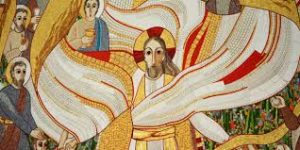 Brothers, we continue to share our search for truth in the Risen Lord today both in the solitude of our prayer and in our fraternal and missionary engagements. Brother Charles is showing us and is also walking with us the path, in our longing to follow Jesus of Nazareth, to be a brother to all, to live Nazareth, to be present to the poor, to review our lives, to cry the Gospel with our lives, to smell like the sheep in our mission to the peripheries, to live the Gospel before we preach. This is our spirituality as diocesan priests in the footsteps of Bro Charles. This is also our gift to our world and to our church today. As a gift, it is undeserved but we need to constantly readjust the gift through practice. Here, we are all beginners and fellow strugglers but together, we encourage one another to keep coming back to our practice.
Brothers, we continue to share our search for truth in the Risen Lord today both in the solitude of our prayer and in our fraternal and missionary engagements. Brother Charles is showing us and is also walking with us the path, in our longing to follow Jesus of Nazareth, to be a brother to all, to live Nazareth, to be present to the poor, to review our lives, to cry the Gospel with our lives, to smell like the sheep in our mission to the peripheries, to live the Gospel before we preach. This is our spirituality as diocesan priests in the footsteps of Bro Charles. This is also our gift to our world and to our church today. As a gift, it is undeserved but we need to constantly readjust the gift through practice. Here, we are all beginners and fellow strugglers but together, we encourage one another to keep coming back to our practice.
 My humble prayer for each one of you. Please also pray for me.
My humble prayer for each one of you. Please also pray for me.
Eric LOZADA
PDF: Easter Letter 2020, Eric LOZADA, brother responsible, eng



